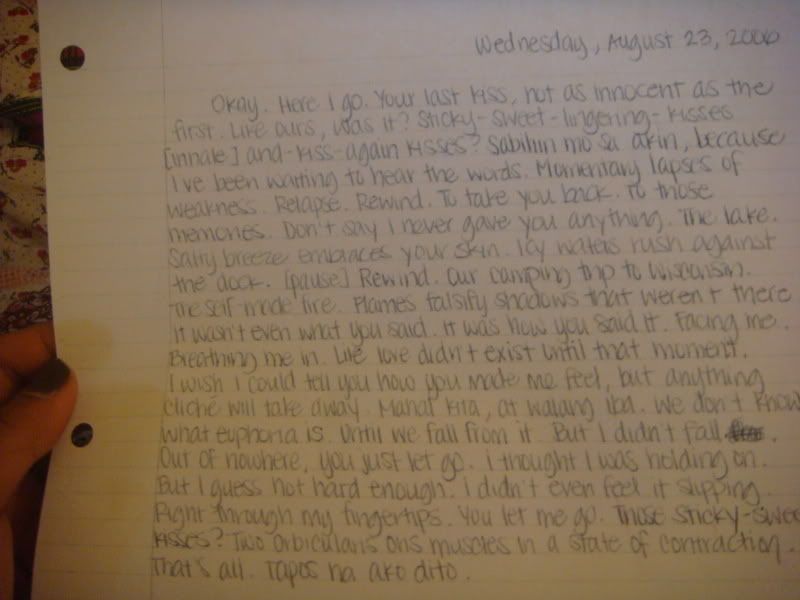Hearing a poem and reading a poem are two entirely different experiences. In my final workshop class last fall, my professor insisted that we read our poem aloud first and then someone else in the class would read it after. I'm not sure I liked his approach, how would someone else know how to read my poem, know the proper pauses at which to linger, or know which words needed to be emphasized? Needless to say, I didn't enjoy listening to my own words read aloud, back to me-- it was as if someone was inside my head, retelling myself of my thoughts already thought. It's not until you hear your own thoughts read back to you that begin to hear yourself, sometimes even for the first time. Every writer has a voice, a style, a rhythm--and I began to hear my own.
I was talking to my friend, Griffin, who has a tendency to insert asides into our instant messaging conversations. Every now and then he'd narrate himself, his actions or even his thoughts. I find myself entertained by his random insertions of these asides and told him that I've always wanted to write a poem based solely on asides. Although when I think of an aside I immediately think of a soliloquy and just would not know where to begin writing. So I began to research writing in the style of the dramatic monologue, which focuses on just the writer's thoughts and perspective with no influence of any outside voice, so there is no dialogue. The writer's speech or commentary is written with the idea of an "implied" audience.
I looked for an example of such a poem and read several, although I enjoyed John Ashbery's "Daffy Duck in Hollywood," the most. It's long and at first seems like just a constant barrage of images and thoughts that are scattered and unorganized. But there is something in the chaos of his speech that is inexplicably captivating and relatable. My favorite lines (54-57) of this poem make me feel like I could have written them myself, Ashbery's universality here is so appealing:
I have
Only my intermittent life in your thoughts to live
Which is like thinking in another language. Everything
Depends on whether somebody reminds you of me.
I admit that I'm not yet prepared to write a poem of that caliber, with such an honest voice as Ashbery's. But writing a dramatic monologue is certainly on my to-do list. The idea of voices in poetry reminded me of a collaboration poem I wrote last year with my best friend, fellow poet, Francesca Pestano. Originally an assignment in class, we decided to write this collaboration poem as prose, something we both struggled with. In this poem I hear my voice, I hear her voice and in certain instances--because our words in English didn't suffice, I hear the lines of tagalog. We felt that writing in our native language worked for this poem, on levels that we couldn't make English work. Many of our peers, (writers and friends) jokingly say that we're the same person, with few but important differences. When we read this poem in class together, we divided the lines intentionally and it sounded like a well rehearsed spoken word segment. After we read the poem the first comment we received was that our voices were indistinguishable. Our classmates, who had been reading our poetry for three months, could not tell who had written which lines--and we were speechless with disbelief. This is a poem we've been meaning to edit for quite some time now, but I'll share it with you as it is. It's a melding of our own experiences, of both happy and painful memories from past relationships. I took a picture of the draft that I wrote by hand and xerox copied for class, we felt that hand-writing it made it more personal, almost like a journal or diary entry.

I know some of you can't honestly read that, so I'll type it out for you. Your thoughts are always welcome.
Wednesday, August 23, 2006
Okay. Here I go. Your last kiss, not as innocent as the first. Like ours, was it? Sticky-sweet-lingering-kisses [inhale] and-kiss-again-kisses? Sabihin mo sa akin, because I've been waiting to hear the words. Momentary lapses of weakness. Relapse. Rewind. To take you back. To those memories. Don't say I never gave you anything. The lake. Salty breeze embraces your skin. Icy waters rush against the dock. [pause] Rewind. Our camping trip to Wisconsin. The self-made fire. Flames falsify shadows that weren't there. It wasn't even what you said. It was how you said it. Facing me. Breathing me in. Like love didn't exist until that moment. I wish I could tell you how you made me feel, but anything cliche will take away. Mahal kita, at walang iba. We don't know what euphoria is until we fall from it. But I didn't fall. Out of nowhere, you just let go. I thought I was holding on. But I guess not hard enough. I didn't even feel it slipping. Right through my fingertips. You let me go. Those sticky-sweet-kisses? Two orbicularis oris muscles in a state of contraction. That's all. Tapos na ako dito.
Remember when I read this poem a long time ago? hahaha :) but I love it dear and Igp love you breast friend!
ReplyDeleteHave you ever considered writing an entire poem or at least some spoken word in Tagalog? Some of the adults in my church do spoken word in Tagalog during get-togethers and I always find myself listeing to the movement and flow of the sounds rather than try to comprehend the words themselves. It's always a trip whenever a tita or tito recites something with that much passion and conviction; so I was wondering if you had ever done that too.
ReplyDelete